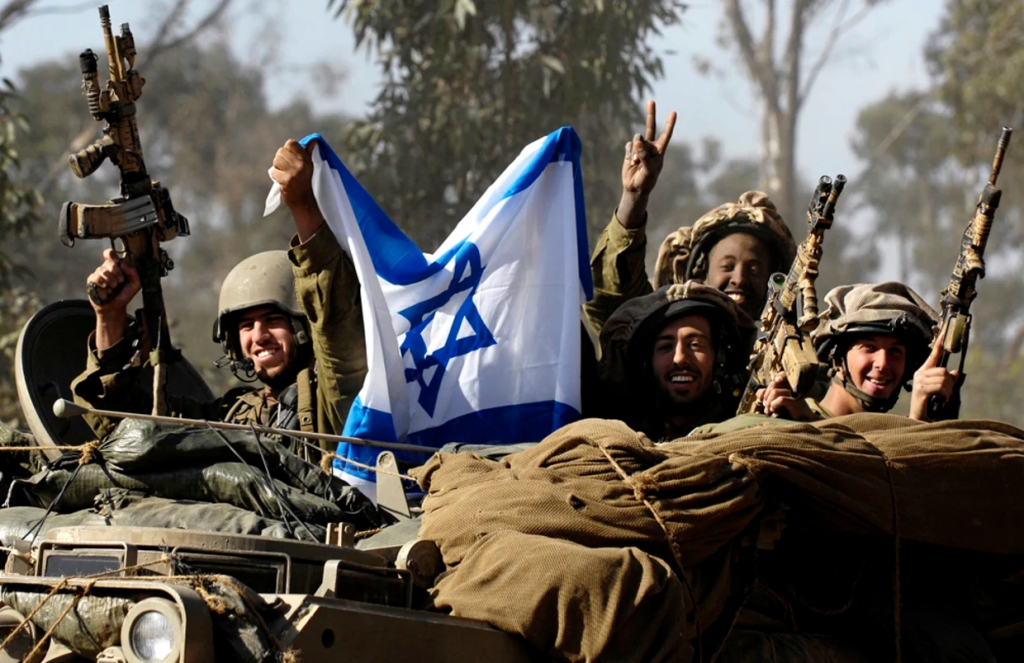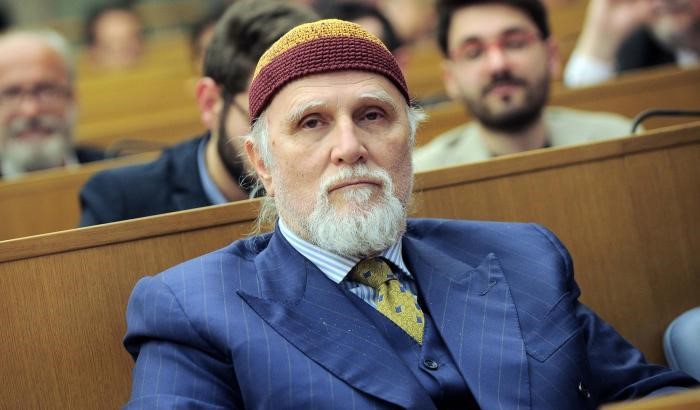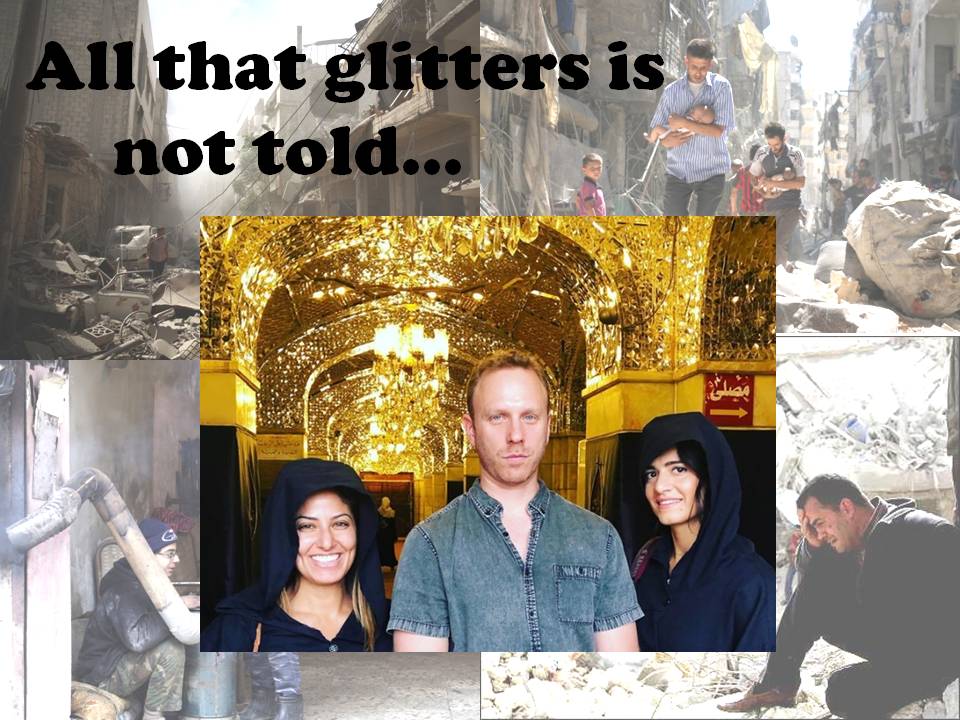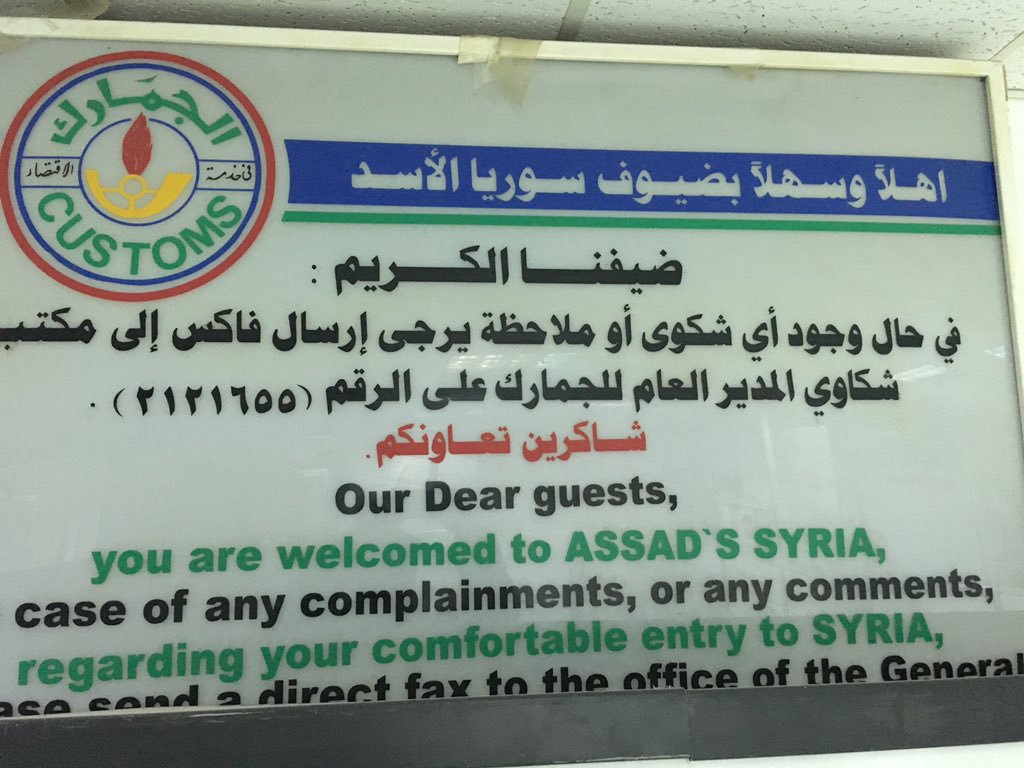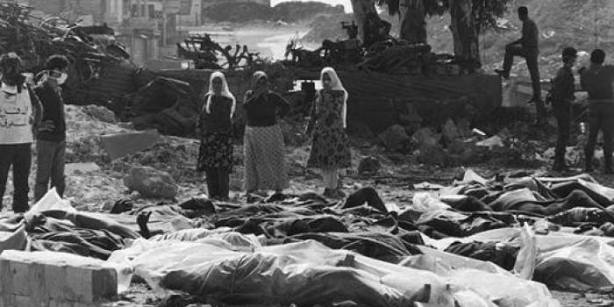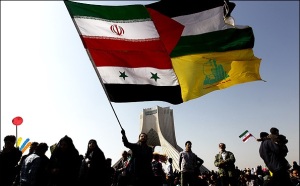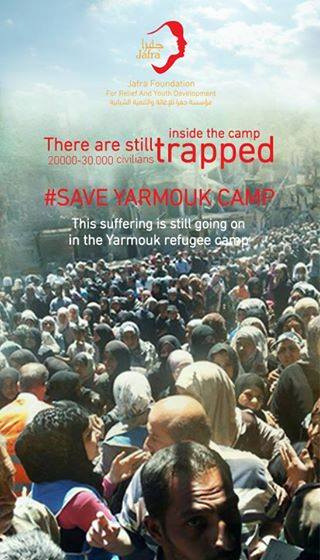
The Third Way march, with their Icons in “yes we can” Shepard Fairey style!
WRITTEN BY HISAM ASHKAR, translated by Laila Attar and Ubiydah Mobarak
News of the visits of fascist and far-right groups to Syria, to show solidarity with the regime, have recently started to emerge, especially with the beginning of the revolutionary process in the Arab region. It seems that the Syrian issue ranks highly on the agenda of the European far-right. So, is it axiomatic to say that the majority of the European far-right supports Assad’s regime and stands against the revolution in Syria?
Nearly two decades ago, several parties and far-right groups started to weave relations with the Syrian regime. For example, communications began between some of the French right in France and the Syrian regime, since the nineties. Many visits then followed. Most notable was that of “Frederic Chatillon“, the president of the extreme student group (Groupe Union Défense), who is very close now to “Marine Le Pen”, the current President of the French party «National Front» (Front National). During his visit in 1994, he met the Syrian Defense Minister at the time “Mustafa Tlass”.
In the first decade of this century, especially since 2006, the visits increased. Most of them took place in Lebanon, the usual place to hold meetings between visitors and the Syrian Social Nationalist Party which is an ally of the Syrian regime. Frederic Chatillon with Alain Sorel were some of the most prominent visitors. This relation was not limited to the official visits and political discussions, it extended to business. For example, the company (Riwal) which is owned by Chatillon, founded the company (Riwal-Syria) to develop economic relations between Syrian and French companies in 2009.

Chatillon, Tlass, Dieudonnè, oh those happy days!
By the start of the uprising in Syria in March 2011, the far-right began to support the Syrian regime in various ways. Frederic Chatillon was the first to support Assad. Since the early days of the revolution, Chatillon accused all those who took part in the demonstrations of the opposition of being partners to the Zionist lobby, which wants to destabilize Syria. Chatillon went even further to organise a demonstration in Paris to support Assad in October of the same year. Chatillon’s company «Riwal» still perseveres to support the news website (InfoSyrie) which is campaigning for the Assad regime.
With time, far-right demonstrations supporting the regime were organised in many European cities, from Rome to Warsaw and Geneva. At the same time, several visits to show support were organized, notably the «fact-finding mission» in June 2013. Several European far-right personalities took part in this visit like Nick Griffin “MP in the House of Commons”, Philip Dewinter “deputy in the Flemish parliament in Belgium”. This extent of the support reached the level of going to Syria to fight along side Assad forces in some cases, as the New-Nazi Greek organization «black tulip» (Mavros Krinos) declared. There were also many meetings held by the far-right which aimed to discuss the Syrian situation and how to support Assad’s regime. The most notable was the Boreal Festival which was held in Kanto in Italy on the 12th of September 2013 in the presence of a large number of European fascists. Paradoxically, the Mayor of Kanto, who was hosting that event, began his speech with words by Rosa Luxemburg!
Why does the European far-right back the Syrian regime?
In her thorough article, “Who are Assad’s fascist supporters?” Leila Shrooms attributes this support to:
“Anti-imperialist/anti-globalism sentiment with a strong focus on national states (they believe the Assad regime protects the Syrian state against US imperialism), Islamophobia (they believe the Assad regime fights Islamic extremists), anti-semitism (they believe Assad’s regime acts as resistance to Israel).”

As for Serge Ayoub, leader of the far-right organization Third way, Troisieme Voie, banned since the summer of 2013, he organized on the 2nd of February 2013 a march in support of the Syrian Assad regime. The reason for his support becomes clear in his answer to the following question, “why are Syrian supporters of the Assad regime participating in this demonstration?” Ayoub replies, “Why are the Syrians with us? Of course, it is our duty to support their cause! Syria is a nation, a homeland, a socialist country with national supremacy. They are fighting for secularism, and they are subject to an attack by imperialist America, globalization and its salafist servants and Qatari and Saudi mercenaries. The purpose is to destroy the state.”
We find in Ayoub’s narrative all the reasons presented by Leila Shrooms, except for Israeli resistance. The far-right does not hide its aversion to Israel, as we have seen in Chatillon. Paradoxically, Ayoub’s supporters who describe themselves as French revolutionary nationalists, and who gained the support of many French and European Fascist organizations, brandished the photographs of five personalities in the demonstration: Bashar Al Assad’s, next to it that of the Russian president Putin, the Belarusian president Lukashenko, the Venezuelan Ex-president Chavez and the national Serb Draga Mihailovič. Many flags were also lifted, among them the Syrian, French, Russian, Venezuelan and Cuban flags.
The grounds for this support presented by all the far-right organizations on the one hand and the organizations who criticize them on the other, stir many questions such as, “Why didn’t this right ally itself with Syria against Israel before the decade of the nineties? Why did this right stand against the Syrian revolution since its beginnings before the rise of the armed extremist Islamic movements? And what is the truth of this anti-imperialist anti-globalization stance of the right?
To demonstrate the background and logic of the right’s position with regards to what is happening in Syria, we have to go back in time 25 years, to a new historical phase that started with the fall of the Berlin wall.
Redefining the enemy: from the communist threat to the threat of the American model.
In his book “The anatomy of Fascism”, Paxton says that Fascist movements are always in need of an enemy that symbolises the overwhelming crises that’s taking society by storm, and who pushes the mass to unite under the flag of the saviour leader. Towards the end of the cold war, most far-right movements in northern Europe considered The Soviet Union to be that enemy-symbol, to the extent that Jean Marie le Pen, the leader of the far-right French party, The National Front, alleged that he carried the legacies of Winston Churchill, Douglas McArthur and Ronald Regan[1], not just in the political arena, but also in the field of Economy. For until the end of the eighties, the National Front was glorifying and defending liberal Economy.[2]
In this context, the fall of communism did not just cause a crisis in the left, rather it went beyond it to reach the far-right, who lost over night its main enemy and one of the basis of its politics. The reconsideration done by some of the members of the right led to adopting ideas of ideological groups such as GRECE, which started since the sixties developing the theory of cultural difference, which opposes racial mixing because it represents a danger for the identity of nations. Hence the United States became the enemy – the new symbol, for various reasons:
1- Cultural and political American dominance represents a threat to national identities.
2- The American model reflects a presence and mix between various races and cultures, regardless of the racism and inequality that are rooted in this model.
Redefining the enemy has forced these right wing forces to reconsider many of their political and economic stances to fit with their new ideological position. It is worth remembering here that far-right and main fascist parties are pragmatic parties which don’t hesitate in redefining their main positions (especially concerning the economy, because they do not rely on a fixed line or position in this field, rather they fluctuate according to the political variables.)[3] In order to achieve their goal: success and power.[4] Hence this Right raised the bar of its animosity towards the USA and the new political order, such as economic neo-liberalism and globalization, and establishing relations with those they consider as enemies of this political order. For example, Jean Marie le Pen is the ally of the Lebanese far-right Phalange party since the mid-seventies, and on his visit to Beirut in 2002, he tried to no avail to meet with Ayatullah Fadlallah, who has close relations with Hezbollah. This redefinition of the enemy is what explains the rapprochement between Hizbollah and the Syrian regime, which started in a shy way in the nineties to become more solid and entrenched in the last ten years.
The new far right: “left wing in its work, right wing in its values”!?…

European delegation in support of Assad, containing members of the extreme right, Zenit, Casa Pound, Stato e Potenza, Fascisti del III Milennio, Partito dei Comunisti Italiani. When Black and Red go to Bed together.
The transformation undergone by the Right because of the redefinition of the enemy on one hand and reprioritization on the other, has led to adopting and overtaking some of the leftist ideas in order to empower this new intellectual orientation. For example, we see that the campaign of Marine le Pen in the French presidential elections of 2012 was based on social and economic issues, to the extent that it almost failed to mention some of the favourite topics of the far-right such as banning migrants. The far-right’s adoption of some of the leftist and Marxist rhetoric is not new; this was clear since the birth of fascism as Mussolini used to address the proletariat and fascists alike with his radical, nationalistic, anti-capitalist speeches. Of course, this was to a great extent a selective and manipulative manoeuvre, because the enemy was foreign capitalism and not the national one, and some of the aims of these speeches were the conciliation between the work force and the nationalistic business owners. [5]
In this context, the reliance of the new right on leftist ideas is nothing but that populist national communism, in other words, a return to the classical Fascist speech like in the twenties, and in one of the most important European capitalist crisis at the time. This return is apparent in the National Front’s adoption of the slogan “No Right and no Left” in a clear reiteration of the saying of the founder of the fascist Spanish Phalange Party (Falange Española de las JONS), Jose Antonio Primo de Rivera), that his movement was neither of the right nor the left.

National Front event, all together now! Zenith, December 2006: A. Soral, JM Dubois, B. Gollnish, D. Joly, Jany Le Pen, F. Chatillon, G. Mahé, Dieudonné and others…
However the current rhetoric and orientation of this Right differs from its 80 year old predecessor in many details. This right does not stop at adopting leftist slogans and headings, it also partially takes from its ideology to add it to its heritage. We see Marine le Pen in her book “For France to live” (Pour que vive la France)[6], relying on sayings by many thinkers, politicians, writers and others from the Left, from George Aurel, to Bertlot Brecht and even Karl Marx himself, praising the beginnings of this Left that she considers to have later on betrayed its principles, insisting that it is now the National Front that carries these objectives. Some far-right thinkers such as Alain Soral have even gone a step further, rather than repudiating the left and the right, they try to bring them together. Soral, the ex member of the French communist party and then the National Front looks at the union of the ethical right with the economic social left against the unethical left that compliments the economic right. In form, on his online political group Egalite et Reconciliation, Soral puts together the photos of Che Guevara, Gaddafi, Mahmood Ahmadi Najad, Vladimir Putin and the far-right French icon Jeanne d’Arc. Alain Soral attacks the global political system represented by the USA and Israel and talks about social justice, and the exploitation of the social classes. He denounces imperialism and demands a real left.
In context, he does not suggest anything new apart from the reconciliation between workers and business owners, with full emphasis on the conservative principles and values which lead to the salvation of the French nation.

Soral might seem like an entertainer mixing economy theology and the conspiracy theory, but his page attracts many visitors and followers, especially youth. The ideas people like Soral promote are translated in the streets, such as members from the Third Way brandishing pictures of personalities and flags as mentioned above. That could sometimes be understood as a communication and coalition between the right and some extreme nationalist left movements, such as the Polish fascist organization (Falanga) which is establishing connections with the Mauis and nationalist Bolsheviks.

The extreme right Italian movement Casa Pound mixes Right, Left and Nationalism all in this poster, Fatherland, Socialism or Death. Honour to Hugo Chavez
This ideological change, even if directed solely at the national internal interest of these parties, carries in its folds the support of this right for the Syrian regime. Theorists such as Soral, consider Bashar Al-Assad to be one of the characters standing in the face of the global system. Moreover, the Syrian regime is the example, even if not ideal, for their slogan, “left wing in terms of work, Right wing in terms of values”. Emphasising that this system is not applicable in Europe rather suitable for “the political idiosyncrasies of the Middle East, where it is important to have a strong leader to control the ethnic sectarian cohesion with a firm hand, and that is usually acceptable by all clans… As was the case in the past [in Europe]”
The limits of the hatred of the far-right for the “Foreigner”
In addition to the excuse of the “pressing foreign danger”, the far-right parties also need and internal enemy that can be a factor in the demise of the mass, and that prevents the achievement of a more comprehensive and stronger society. [7] Among the internal enemies of this Right is the “foreigner”, and in Europe the two main “foreigners” in the eyes of the far-right are the Jews and recently the Muslims. However the anti-Semitism of this Right does not always translate into animosity towards Israel. In the era of the cold war, most of the far-right considered Israel as the fortress of the west in the face of the Soviet Union. However this rapprochement was always hindered by the position of the far-right with regards to the holocaust. With the end of the cold war, and the redefining of the enemy, Israel moved from the impervious fortress in the face of the communist danger to the strongest ally of the new American enemy. This development was accompanied by a change in the perception of some of this right and their rapprochement to some of the European groups, in a step some researchers attribute to the appearance of a new danger for this Right in Europe, namely the Muslims.
This comparison remains somehow simplistic, for Islamophobia can represent an incentive for this rapprochement, however it does not explain the radical change in the perception of the far-right towards the foreigner. A few decade ago, we find that some of the prominent faces of the far-right were either Jewish or of Jewish origins, one of the most eminent examples is the vice-president of the National Front and life partner of Marine Le Pen, Louis Aliot, who has Jewish Algerian roots. Moreover, in the French parliamentary elections of 2012, the national front nominated the Jewish Michel Toris for one of the seats in Paris. Also, Far-right Jewish organizations such as the Jewish Defence League, were always close to the far-right, first to the (Bloc identitaire) then to the National Front. If we go back in time to the early nineteen twenties, we find that Mussolini’s fascist party included many Jews.[8] Hence we see that the far-right antagonizes the “foreigner” who tries to hold on to his idiosyncrasies and characteristics, while accepting the “foreigner” who adopts the values and principles of this Right – or in other words, who fuses nationally, according to the fascist expressions – then this foreigner becomes a part of that right, in that case he can assume leading positions such as Serge Ayoub who is from Lebanese origins. Therefore it will be no surprise to find Muslims among the electoral list of some of the far-right parties in Europe, and that’s in the near future.
This is with regards of the internal foreigner so what about the external one? From the unstable relationship between the Far-right and the Jews and Israel, and despite the recent antagonism with Israel, some of this right such as the National Front is trying to restore what was severed for internal electoral reasons. In this context, Marine Le Pen has declared to the Israeli newspaper Haaretz in 2011 that “The National Front was a constant supporter of the Zionist movement and a constant defender of Israel’s right to exist.”
However, we would be mistaken to think of this speech just as an electoral campaign, it has to be considered carefully and seriously. Defending Israel’s right to exist does not necessarily mean supporting it, the support is for the Zionist movement, i.e. for another far-right nationalist ideology, that decided to create an entity outside the European Nationalistic movements. The far-right parties while denying foreigners the right to be within its national and geographical borders, do not deny it the right to exist within its own geographical borders, as long as it does not clash with its own sphere. This explains the cooperation and communication between the far-right parties internationally.

Hezbollah, what a group salute that is!
This clarifies the original seeming paradox. There is no contradiction in the support of the Far-right for the Syrian regime, and their animosity towards the Syrian refugees in their countries even if they were pro-regime. Moreover, animosity towards Islam becomes a secondary reason to back Assad. We mustn’t forget that this Right supports, even boasts about fighting side to side with an Islamic party, Hizbollah, as declared by the organization “Black Tulip”. One can also see clearly the pivotal role of the far-right parties that are Assad’s regime’s allies, in forming and strengthening this relationship and what that entails. This explains the regular visits of this European right to Beirut to meet parties such as the Syrian National Social party. The role of this party in particular and its network with the European Far-right deserves deeper consideration, to achieve a more comprehensive understanding of the topic.
Conclusion
This article has attempted to look at the Far-right in general, while in reality this right has various ideologies. This difference takes many forms according to the type and volume of these groups, from the bigger more pragmatic parties to the intellectual circles and the more radical paramilitary groups. Nonetheless, the general principles are the same, even if the difference in form seems radical, this remains particular and not essential. As we have seen in this article, any reading or analysis of the Right’s position has to take into consideration that the ideology that this right portrays is moving and constantly changing. One of the important tools for analysis and rapprochement is the basis that Paxton deduced such as to feel the crushing burden of a crisis that cannot be solved in a traditional way, priority of the group over the individual, considering the mass as victim and fearing for its demise. There is a need for a closer-knitted purer society, etc…

the Far Left sure looks like the Far Right, Good thing there is the hammer and sickle to remind us!

Hands off Syria, Love to Assad
As for why does the far-right support the Syrian regime? The main reason is that the ideological crossing between the right and what it represents and what the Syrian regime represents has happened at this historical moment. For this Right, this represents one of the aspects of its advertising campaign with the enemy – the new symbol. This support also represents its difference from the other European political parties and movements, which he accuses of being a toy in the hand of this enemy. Although this Right knows that it is not possible to exploit this support internally, because of the bad reputation and violence of the Syrian regime, the development of events in Syria allows it to exploit European public opinion through sympathizing with the situation of the Christians in the east for example, or through the topic of European Jihadists in Syria. This matter requires further investigation to reveal the extent and ramification of these relations.
Most importantly, one of the main incentives behind these reasons is the inherent opportunism of the Far-right’s ideology that will not hesitate in taking whatever stance or doing whatever it takes to get even a little closer to power.
[1] Ariane Chebel d’Appolonia, L’Extrême droite en France. De Maurras à Le Pen, Bruxelles: Editions Complexe et PUF, 1987.
[2] Sylvain Crépon, La nouvelle extrême droite: Enquête sur les jeunes militants du front National, Paris: L’Harmattan, 2006.
[3] Local examples for this: the rapprochement of the National Social Syrian Party in Lebanon to the Marxist propositions in the sixties, after a failed coup on New Year’s Eve 1962.
[4] Robert Paxton, the Anatomy of Fascism, New York: Knopf, 2004.
[5] Paxton, 2004
[6] Marine Le Pen, Pour que vive la Farnce, Paris: Grancher, 2012
[7] Paxton, 2004
[8] Paxton, 2004
Translated by Laila Attar and Ubiydah Mobarak from Arabic ORIGINAL http://al-manshour.org/node/4904&usg=ALkJrhjqYVOhwg5JmixoJ5kn2QJQJfWlMA
